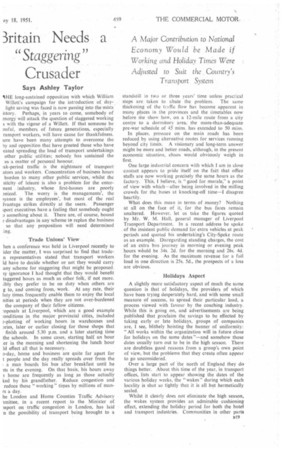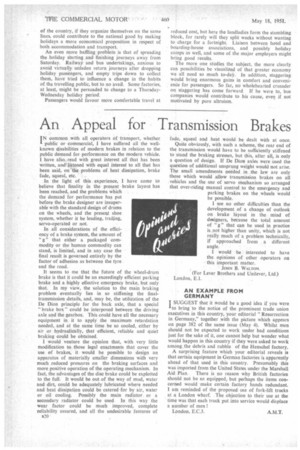3ritain Needs a
Page 53

Page 54

If you've noticed an error in this article please click here to report it so we can fix it.
"Staggering"
Crusader
A Major Contribution tO National Economy Would be Made if Working and Holiday Times Were Adjusted to Suit the . Country's Transport System Says Ashley Taylor HE long-sustained opposition with which William Willett's campaign for the introduction of day-• light saving was faced is now passing into the mists istory. Perhaps, in years to come, somebody of :nergy will attack the question of staggered working
s with the vigour of a Willett. If that someone be ssful, members of future generations, especially ransport workers, will have cause for thankfulness. iere have been many attempts to overcome the hy and opposition that have greeted those who have eated spreading the load of transport undertakings other public utilities; nobody has sustained the as a matter of personal honour.
ak-period traffic is the nightmare of transport ators and workers. Concentration of business hours burden to many other public services,-whilst the sticity of leisure is also a problem for the enternem industry, whose first-houses are poorly mized. The worry is the managements', the iyance is the employees', but most of the real 'vantage strikes directly at the users. Passenger ;port executives have a feeling that somebody ought o something about it. There are, of course, bound disadvantages in any scheme to replan the business so that any proposition will need determined Mg.
Trade Unions' View
hen a conference was held in Liverpool recently to ider the matter, I was surprised to find that trade n representatives stated that transport workers Id have to decide whether or not they would carry any scheme for staggering that might be proposed. ay ignorance I had thought that they would benefit taggered hours as much as other folk, if not more. .ibly they prefer to be on duty when others are g to, and coming from, work. At any rate, their luty times frequently enable them to enjoy the local nities at periods when they are not over-burdened the company of their fellow citizens.
.oposals at Liverpool, which are a good example ;onditiong in the major provincial cities, included -plotting of working hours. in warehotises and 3ries, later or earlier closing for those shops that finish around 5.30 p.m. and a later starting time the schools. In some cases, starting half an hour er in the morning and shortening the lunch hour ld effect all that is necessary.
D-day, borne and business are quite far apart for t people and the day really spreads over from the a man boards his bus after breakfast until he 'its in the evening. On that basis, his hours away home are frequently as long as those actually ked by his grandfather. Reduce congestion and reduce those "working" tirries by millions of manrs a day.
he London and Home Counties Traffic Advisory imittee, in a recent report to the Minister of uport on traffic congestion •in London, has laid n the possibility of transport being brought to a standstill in two or three years' time unless practical
steps are taken to abate the problem. The same thickening of the tioffic flow has become apparent in many places in the provinces and the iiinetables now before me show how, on a 12-mile route from a city centre to a dormitory area, the more-than-adequate pre-war schedule of 45. mins. has extended to 50 mins.
In places. pressure on the main roads has been reduced by using alternative routes for services running beyond city limits_ A visionary and tong-term answer might be more and better roads, although, in the present economic situation, chaos would obviously weigh in first.
One large industrial concern with which I am in close contact appears to pride itself on the faet that office staffs are now working precisely the same hours as the factory. This, I believe, is " good for morale," a point of view with which—after being involved in the milling crowds for the buses at knocking-off time—I disagree heartily.
What does this mean in terms of money? Nothing at all on the face of it, for the bus fares remain unaltered. However, let us take the figures quoted by Mr. W. M. Hall, general manager of Liverpool Transport Department. In a recent address he spoke of the insistent public demand for extra vehicles at peak periods and quoted his undertaking's City-Speke route as an example. Disregarding standing charges, the cost of an extra bus journey in morning or evening peak hours w6uld be 34s. 2d. for the morning and 26s. 4d. for the evening. As the maximum revenue for a full load in one direction is 25s. 5d., the proSpects of a loss are obvious.
Holidays Aspect A slightly more satisfactory aspect of much the same question is that of holidays, the providers of which have been trying desperately hard, and with some small measure of success, to spread their particular load, a process viewed with favour by the coaching industry. While this is going on, and advertisements are being published that proclaim the savings to be effected by taking early or late holidays, groups of companies are, I see, blithely hoisting the banner of uniformity: "All works within the organization will in future close for holidays on the same dates "—and somehow those dates usually turn out to be in the high season. There are doubtless good reasons from a group's own point of view, but the problems that they create often appear to go unconsidered.
Over a large part of the north of England they do things better. About this time of the year, in transport offices, lists start to appear showing the dates of the various holiday weeks, the "wakes" during which each locality is shut so tightly that it is all but hermetically sealed.
Whilst it clearly does not eliminate the high season, the wakes system provides an admirable cushioning effect, extending the holiday period for both the hotel and transport industries. Communities in other parts
of the country, if they organize themselves on the same lines, could contribute to the national good by making holidays a more economical proposition in respect of both accommodation and transport.
An even more baffling problem is that of spreading the holiday starting and finishing journeys away from Saturday. Railway and bus undertakings, anxious to avoid virtually unladen return journeys after dropping holiday passengers, and empty trips down to collect them, have tried to influence a change in the habits of the travelling public, but to no avail. Some factories, at least, might be persuaded to change to a ThursdayWednesday holiday period: Passengers would favour more comfortable travel at reduced cost, but here the landladies form the stumbling block, for rarely will they split weeks without wanting to charge for a fortnight. Liaison between hotel and boarding-house associations, and possibly holiday camps as well, and some of the major employers might bring good results.
The more one studies the subject, the more clearly can possibilities be visualized of that greater economy we all need so much to-day. In addition, staggering would bring enormous gains in comfort and convenience for passengers. So far, no wholehearted crusader on staggering has come forward. If he were to, bus companies would contribute to his cause, even if not motivated by pure altruism.




























































































